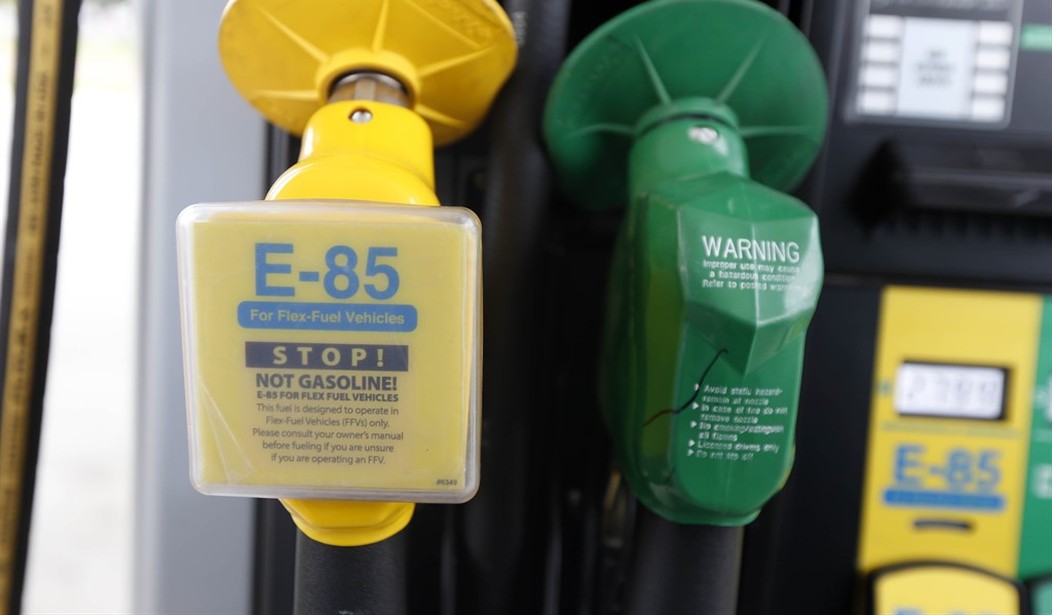The Renewable Fuel Standard (RFS)—also known as the ethanol mandate—was passed by Congress in 2005 and expanded in 2007. Regardless of market conditions, it required ever-increasing quantities of biofuel be blended into the nation’s gasoline supply—though the Environmental Protection Agency (EPA) does have the flexibility to make some adjustments based on conditions, such as availability and infrastructure.
At the time of its passage, it was unfathomable that a decade later Americans would be consuming less gasoline, not more. Instead of requiring a set, or even growing, percentage of ethanol be used, the law called for an increasing amount of gallons—which has created unforeseen complications.
Since the law was passed, due to increased fuel efficiency and a generally sluggish economy (meaning fewer people are driving to and from work every day) we’ve been using less gasoline, not more. Requiring more and more ethanol in less and less gasoline is not what the original law intended.
It was believed that the RFS would help achieve energy independence and reduce CO2 emissions—both ideas from a different era.
The RFS was passed at the low point of a decades-long decline in U.S. oil production. At the time, no one knew that the trend line would totally reverse due to American ingenuity and the innovations of horizontal drilling and hydraulic fracturing that have unleashed the new era of abundance. Additionally, it was believed that corn-based fuel (which is the primary source for ethanol in the U.S.) would reduce carbon dioxide emissions—though the results have been questionable at best.
Since the RFS became law, numerous studies have been done to determine the environmental benefit of ethanol over gasoline—many of which conclude that ethanol is actually more detrimental than gasoline. At a recent House Oversight Committee hearing, John DeCicco, a research professor at the University of Michigan’s Energy Institute, said, according to Morning Consult, “the studies assuming biofuels are carbon neutral are flawed.” Morning Consult reports: “he has found ethanol’s net emissions to be as much as 70 percent higher than traditional gasoline.”
Recommended
Ethanol has an unlikely collection of opponents. Addressing ads put out by the ethanol lobby positing that only “big oil” wants to end the ethanol mandate, FactCheck.org disputes the claim: “Several environmental groups oppose it as well. So does a wide coalition that includes restaurant owners concerned about upward pressure on food prices and boat manufacturers upset at the problems that ethanol can cause in marine engines.”
Despite the controversy, the EPA claims the RFS is a “success.” Janet McCabe, acting assistant administrator for EPA’s Office of Air and Radiation, says: it “has driven biofuel production and use in the U.S. to levels higher than any other nation. This administration is committed to keeping the RFS program on track, spurring continued growth in biofuel production and use, and achieving the climate and energy independence benefits that Congress envisioned from this program.”
With this in mind, it is no surprise that the biofuel industry—which wouldn’t exist without the ethanol mandate—was unhappy when, on May 18, the EPA released its biofuel blending requirements for 2017. Using its ability to make adjustments, the EPA announcement was less than the law required, but more than the market demands. The Wall Street Journal (WSJ) states; “EPA officials said they were seeking to strike a balance between Congress’s goal of using more ethanol and the realities of the current fuel market and infrastructure.” Instead, no one was happy.
In Biomass Magazine, McCabe defends the action: “The fact that Congress chose to mandate increasing and substantial amounts of renewable fuel clearly signals that it intended the RFS program to create incentives to increase renewable fuel supplies and overcome constraints in the market. The standards we are proposing would provide those incentives.”
Chet Thompson, president of American Fuel & Petrochemical Manufacturers, which represents refineries regulated under the standard, responded: “EPA’s proposal threatens to force consumers to use more biofuel than vehicles, engines and fueling infrastructure can handle.” He says: “the proposed volumes still go beyond marketplace realities.”
In contrast, a statement from Chip Bowling, president of the National Corn Growers Association said: “In the past, the EPA has cited a lack of fuel infrastructure as one reason for failing to follow statute. Our corn farmers and the ethanol industry have responded. Over the past year, we’ve invested millions of dollars along with the U.S. Department of Agriculture’s Biofuel Infrastructure Partnership to accelerate public and private investment in new ethanol pumps and fuel infrastructure. The fact is, today’s driver has more access than ever to renewable fuel choices.”
Regarding the EPA’s May 18 decision, DeCicco told me: “The EPA is trying to pick an economic middle road between the proponents and the opponents. But, through the RFS, the environment has been run off the road. Contrary to what has been promoted by the Department of Energy and some other government agencies, biofuels make CO2 emissions worse rather than better.”
At the aforementioned House hearing, Representative Jim Jordan’s (R-OH) opening statement called the RFS “a classic example of what happens when you get a bunch of politicians together who think they’re smarter than the marketplace.”
Frank Macchiarola, downstream director at the American Petroleum Institute, is calling on Congress to “repeal or significantly reform the RFS.” He asserts: “Members on both sides of the aisle agree this program is a failure, and we are stepping up our call for Congress to act.”
Proving Macchiarola’s point, before the 2017 requirements were released, on May 10, U.S. Representatives Bill Flores (R-TX), Peter Welch (D-VT), Bob Goodlatte (R-VA), Jim Costa (D-CA), Steve Womack (R-AR), and Cedric Richmond (D-LA) introduced bipartisan RFS reform legislation. The Food and Fuel Consumer Protection Act, H.R. 5180, limits the RFS mandate to levels that our nation’s cars, trucks, boats and other small engines can safely accommodate. The bill “directs EPA to consider current market realities and cap the maximum volume of ethanol blended into the transportation fuel supply at 9.7 percent of projected gasoline demand.” Following the news, the bill’s cosponsors issued a statement calling the RFS “unsustainable.”
It is time to get back to allowing the free market—not Congress, not unelected bureaucrats, not mandates, not artificially spurred growth in a chosen industry—to determine our fuel choices. Because ethanol is an effective octane-boosting additive, it will always have market demand. Farmers who’ve invested in it will not be driven out of business. The Food and Fuel Consumer Protection Act, while not repealing the RFS outright (which would be tough to pass), offers a reasonable fix to well-intended, but flawed legislation.

























Join the conversation as a VIP Member